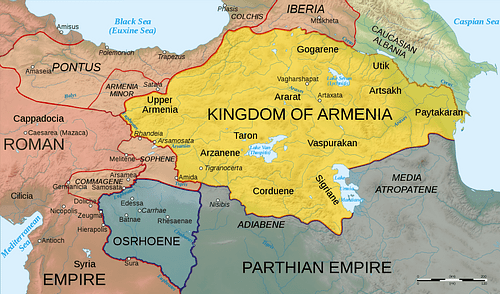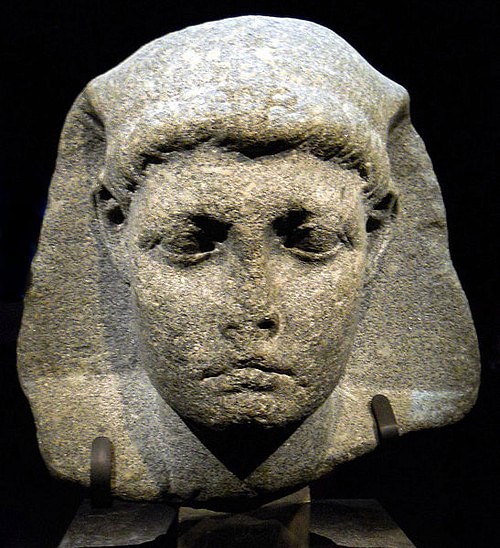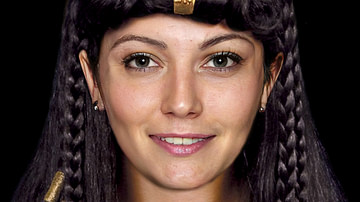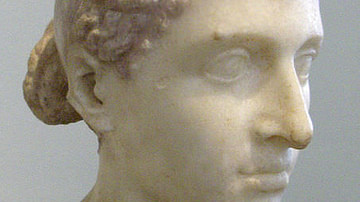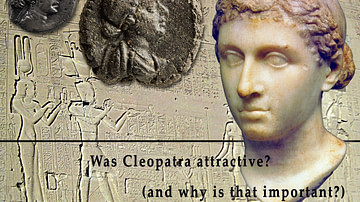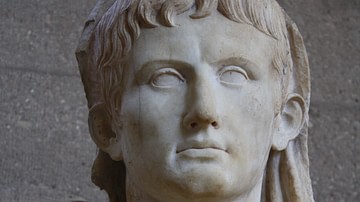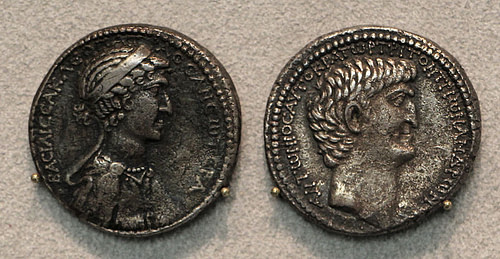
Alexander Helios (40 BCE – c. late 1st century BCE) was a member of the Ptolemaic dynasty, the second oldest son of Cleopatra VII (69 BCE – 30 BCE) and the twin brother of Cleopatra Selene II (40 BCE – 5 BCE). He spent the majority of his life in Alexandria, not meeting his father Mark Antony (83 BCE – 30 BCE) until he was three years old.
In 34 BCE, Alexander Helios was proclaimed king of Armenia, Media, and Parthia, although his young age made him a king in name only. Alexander Helios' future took a turn after a war broke out between his parents and Octavian (the future Roman emperor Augustus, r. 27 BCE - 14 CE) in 32 BCE. After Octavian's conquest of Egypt and the subsequent suicide of Antony and Cleopatra, Alexander Helios, his twin Cleopatra Selene II, and their younger brother Ptolemy Philadelphus were taken back to Rome. It is unknown what became of Alexander Helios after this point, but death by illness is likely.
Early Life
Alexander and his twin sister Cleopatra were born in Alexandria, Egypt sometime in late 40 BCE. The twins were the first of three children born to Roman triumvir Mark Antony and the Ptolemaic Egyptian queen Cleopatra VII, to be followed by Ptolemy Philadelphus in 37 BCE. Alexander Helios was probably named after Alexander the Great, the most renowned figure of the Hellenistic period and one of Cleopatra's personal heroes. Cleopatra's choice in name was an unusual break from tradition, as male members of the Ptolemaic dynasty were usually given the name of Ptolemy. Ptolemy X and XI had both used the name Alexander but only as a surname, and their unimpressive legacies make them unlikely candidates for Alexander Helios' naming.
Mark Antony had departed from Egypt shortly before Alexander and his sister were born. Antony married Octavia Minor in 40 BCE to help strengthen his faltering alliance with Octavia's brother, Octavian. Antony and Octavia spent the next three years in Greece where they had two daughters, Antonia Major in 39 BCE and Antonia Minor in 36 BCE.
As a result of Mark Antony's extended absence, the first time that Alexander Helios and Cleopatra Selene met their father was in 37 BCE when Antony summoned Cleopatra to meet him in Antioch. It is likely that Alexander and his younger sister Cleopatra received their surnames, Helios and Selene respectively, from their father around 37 BCE. The name Helios is Greek for “Sun” and was also the name of the Titan who personified the Sun. Alexander's twin sister was given the nickname Selene, Greek for "Moon", and the name of the mythological Titan's twin sister. Cleopatra Selene II's nickname doubled as a reference to their ancestor Cleopatra Selene I of Syria.
Role in Roman Politics
The actual purpose of Antony and Cleopatra's meeting in 37 BCE was to allow Antony and Cleopatra to renew their alliance and make preparations for Antony's planned invasion of the Parthian Empire. Tensions between the Roman Republic and the Parthian Empire had come to a head earlier when Marcus Licinius Crassus launched a doomed invasion of Parthia in 53 BCE. Despite having a numerical advantage over the Parthians, the majority of the Roman forces were killed or captured at the Battle of Carrhae (53 BCE), including Crassus and his son Publius.
The Roman dictator Julius Caesar (100 BCE - 44 BCE) had planned to conquer the Parthian Empire, but these plans were halted when Caesar was assassinated by a ring of conspirators in 44 BCE. For Mark Antony, carrying out Caesar's planned invasion of Parthia was an opportunity to avenge Crassus' humiliating defeat and to increase his own popularity as a commander.
Antony's invasion of the Parthian Empire in 36 BCE turned out to be a disaster, like so many Roman campaigns against the Parthians. His forces suffered tens of thousands of casualties, with more than half of these perishing from disease. Antony partly blamed his defeat on the betrayal Artavasdes II of Armenia (r. 54 BCE – 34 BCE), one of the Roman Republic's key allies against the Parthians. Artavasdes II of Armenia abandoned Antony's cause as the campaign grew in scale, leaving Antony without crucial reinforcement.
These events made it necessary for Antony to turn his attention towards Armenia in 35 BCE, with the intent to stage a future invasion of Parthia from there. In an attempt to lure Artavasdes II into negotiations, Antony permitted his lieutenant Quintus Dellius to offer Alexander Helios - then about six years old - in marriage to Artavasdes II's daughter. However, the Armenian king grew suspicious of the offer and refused the engagement. The Armenian king's caution was ultimately not enough to safeguard him, however, as Mark Antony invaded and subdued Armenia that year, taking Artavasdes II and his family as hostages.
The conquest of Armenia was celebrated during the Donations of Alexandria in 34 BCE. During this elaborate ceremony, Antony formally bestowed additional territories on Cleopatra and her children, redrawing the political map of the Near East. Alexander Helios was proclaimed King of Kings like his brother Caesarion and was granted territories which included Armenia, Media, and Parthia. Alexander Helios himself appeared in the costume of an Iranian prince, signifying his new dominion. However, this coronation was not much more than a formality as Alexander Helios was only about six years old at the time and the kingdoms of Parthia and Media were still outside of his parents grasp in any case.
Mark Antony found a new ally against the Parthians in Artavasdes II's rival, Artavasdes I of Media Atropatene (r. 56 BCE - 20 BCE). Antony's new alliance with Artavasdes I was further solidified when Alexander Helios was engaged to Iotape, the 9-year-old daughter of Artavasdes I of Media in 34 BCE. Iotape spent the next few years of her life in Alexandria, although the young age of both parties meant that the planned marriage would not occur for years to come.
Later Years & the Final War of the Roman Republic
Years of tensions between Mark Antony and Octavian came to a head in 32 BCE when Octavian instigated the Roman Senate to declare war on Cleopatra. Antony and Cleopatra eventually lost the final war of the Roman Republic at the Battle of Actium in 30 BCE. Fearing the eventual fate of her children, Cleopatra made overtures to Octavian in the hopes of securing the reign of her children following what would be a voluntary exile for herself and Antony. Despite a seemingly never-ending series of negotiations, Cleopatra failed to reach a firm agreement with Octavian before he invaded Egypt in the summer of 30 BCE.
Following the conquest of Egypt and the subsequent suicide of Antony and Cleopatra, Octavian ordered the death of Caesarion, Alexander Helios' older half-brother and the son of Julius Caesar. Perhaps out of a desire to demonstrate his benevolence and because they were too young to be a threat, Octavian spared Cleopatra's three children by Antony. When Octavian departed Egypt to return victoriously to Rome, Alexander Helios and his remaining siblings were brought along as captives.
During the Roman triumph celebrating Octavian's victory, Alexander Helios and Cleopatra Selene II were marched through the streets of Rome in golden chains behind a wax effigy of their mother. The thick golden chains were too heavy for the 11-year-old twins who found themselves struggling to walk. This pitiful sight moved the onlookers who cried out for mercy on behalf of the children, something which Octavian readily obliged.
Octavian turned the twins over to the care of Octavia Minor along with the rest of Antony's children. It is unclear what became of Alexander Helios after this point, but Roman accounts do not mention him, unlike his twin sister, in the years that follow. In all likelihood, Alexander Helios and Ptolemy Philadelphus did not live to adulthood, possibly succumbing to illness.
